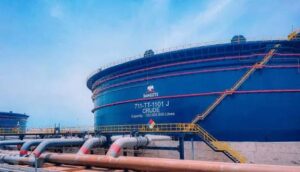
Africa’s richest man, Aliko Dangote, is facing fresh challenges at his $20 billion Dangote Petroleum Refinery as operational disruptions slow production and crude intake, according to Bloomberg, citing industry data and market sources.
The mega refinery faces output slowdown
Tanker-tracking figures and cargo allocation lists compiled by Bloomberg show the 650,000-barrel-a-day refinery has been purchasing far less crude oil in recent weeks. The plant is expected to buy fewer than 300,000 barrels per day this month—including both domestic and imported supplies—a steep drop of more than 50 percent from its July peak.
The decline in crude purchases, analysts say, suggests the refinery is operating well below capacity due to technical issues, unplanned outages, and worker-related disruptions. The reduced run rate may continue into early next year, potentially affecting Nigeria’s domestic fuel supply and keeping gasoline prices elevated.
Refinery may shut again for repairs
IIR Energy, an intelligence firm that tracks refinery operations, reported that the facility has experienced several stoppages this year and could face another shutdown early next year to complete major maintenance work. While the refinery remains Africa’s largest, questions are growing over how soon it can operate close to its full potential.
Under a recently signed supply deal, the Nigerian National Petroleum Company (NNPC) Limited is expected to deliver around 150,000 barrels a day of crude to the plant this month. NNPC cargo allocations seen by Bloomberg show a similar volume is planned for November, providing some stability as Dangote works through operational bottlenecks.
Inside Dangote’s refinery challenges and resolve
The refinery, which began production earlier in 2024 at around 350,000 barrels per day, ramped up to 650,000 barrels and had aimed to reach 700,000 barrels by late 2025. But the recent setbacks have cast doubt on that timeline. Since peaking in July—driven largely by increased imports from the United States—the refinery’s crude intake has fallen sharply, pointing to lower throughput rates and signs of weaker local demand for imported fuel.
In September, tensions rose between the refinery’s management and Nigeria’s oil workers’ union, PENGASSAN, which accused Dangote of anti-labor practices. Despite the dispute, the refinery went ahead to secure a two-year crude supply agreement with NNPC to help ensure consistent feedstock and support domestic fuel stability through 2027.





